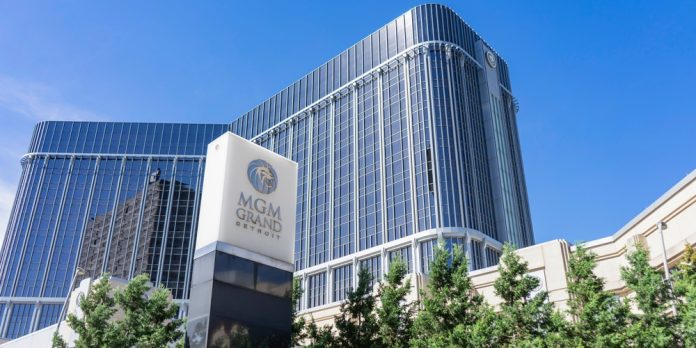Detroit’s three commercial casinos reported monthly aggregate revenues of $103.5m in January, a decline compared to the previous month (Dec. 2022: $109.9 m), but an improvement year-over-year (Jan. 2022: $100.9m).
MGM Grand Detroit holds the most significant market share out of all three casinos in the city at 48%, followed by Motor City Casino at 30%, and Hollywood Casino at Greektown at 22%.
Per vertical, slots and table games produced $103.4m in revenue, while retail sports betting fell drastically compared to the previous month and YoY, only generating revenues of $111,023.
According to Michigan Gaming Control Board data, January’s $103.4m in table games and slot revenue grew by 4.4% YoY (Jan. 2022: $98.97m) but fell by 4.5% compared to the previous month (Dec. 2022: $108.3m).
Each one of Detroit’s three casinos saw gaming revenue improvements compared to January the previous year.
MGM rose by 3.2% to $50.2m (2022: $48.65m), Motor City saw a 1.3% increase to $30.3m (2022: $29.87m), while Hollywood Casino grew by 11.9% to $22.9m (2022: $20.45m).
The three casinos paid $8.4m in gaming taxes to the state of Michigan (Jan. 2022: $8m), while also submitting $16.3m (2022: $11.8m) in wagering taxes and development agreement payments to the City of Detroit.
Retail sports betting sees significant declines
Off a handle of $15.3m, retail sports betting at the three Detroit casinos achieved total gross receipts of just $149,379, a significant decline compared to the previous month (Dec. 2022: $1.65m) and YoY (Jan. 2022: $1.97m).
As previously mentioned, retail sports betting revenue (qualified adjusted gross receipts – QAGR) for the month came in at $111,023, a 94.3% decrease YoY (Jan. 2022: $1.93m), and a 93.2% drop compared to the previous month (Dec. 2022: $1.6m).
Motor City was the only Detroit casino with a positive QAGR for the month of $236,503, while MGM and Hollywood Casino both made losses of -$62,725 and -$62,755 respectively.
As a result, the casinos only paid $8,940 in state taxes for the month (Jan. 2022: $73,070) and submitted $10,926 (2022: $89,308) in wagering taxes to the City of Detroit.
In fantasy contests, which are reported a month behind casino games and retail sports betting, operators reported total adjusted revenues of $1.6m in December, paying $133,324 in state taxes.
For the full year, fantasy contest operators declared $16.8m in adjusted revenues, paying the state $1.4m in taxes.















